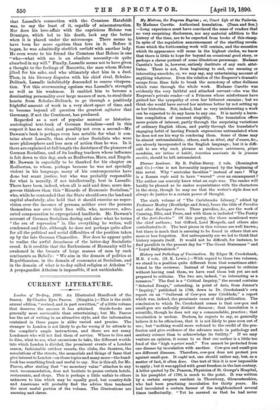My Mistress, the Empress Eugenie or, Court Life at the
Tuileries. By Madame C,aretto. Authorised translation. (Dean and Bon.) —Long experience must have convinced the mass of readers that no very surprising disclosures, nor any material addition to the history of the time, are to be expected from books of this stamp. In spite of the regulation announcement of the startling revela- tions which the forthcoming work will contain, and the sensation which its appearance will cause in the highest circles, we know that there is little to hope for beyond an occasional good story, or perhaps a clever portrait of some illustrious personage. Madame Carette's book is, however, entirely destitute of any such attri- butes. There is not, from beginning to end, one amusing or interesting anecdote, or, we may say, any entertaining account of anything whatever. Even the relation of the Emperor's dramatic escape from Ham fails to break the monotony of utter dullness which runs through the whole work. Madame Carette was evidently the very faithful and attached servant—she was the Empress's private reader—of a Princess whose misfortunes have gained her the sympathy of even her bitterest enemies ; but we think she would have served her mistress better by not setting up as her historian. Not, indeed, that so very uninteresting a work can be expected to do any harm to any one. It is merely a harm- less compilation of innocent stupidity. The translation offers more points of interest, partly through the surprising variations of ordinary English idiom, and partly through the translator's engaging habit of leaving French expressions untranslated when he does not see his way to rendering them. Some of these may be almost untranslatable; others, such as debut, chef d'ceuvre, &c., are already incorporated in the English language ; but it is diffi- cult to see why such phrases as influences exterieures, pieges mondains, air intime et hatrite, evocation souriante de is jeunesse envolee, should be left untranslated.


















































 Previous page
Previous page